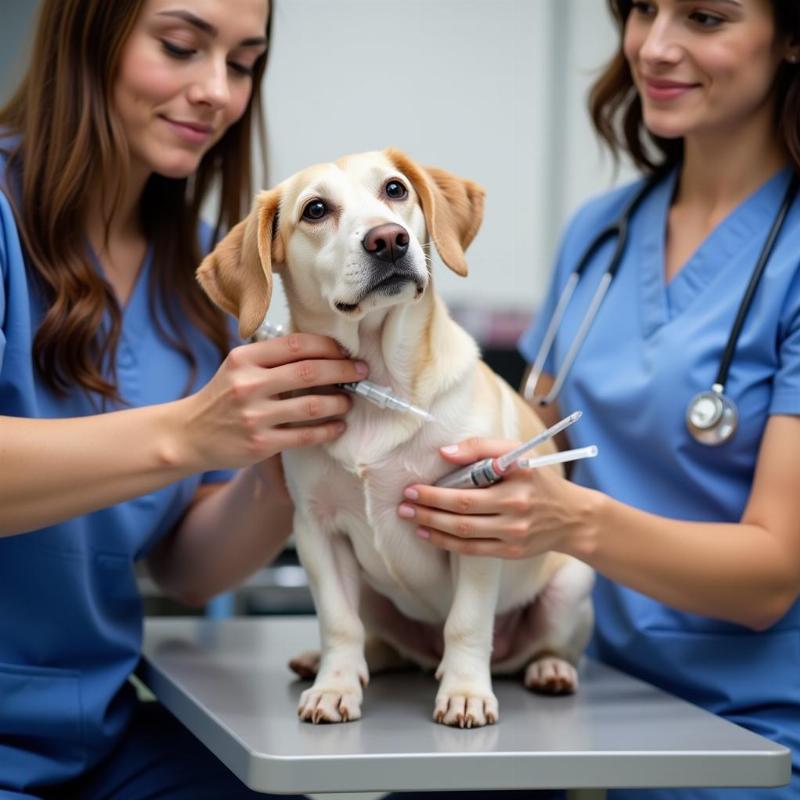Rabies is a deadly disease, and a valid concern for dog owners. You likely diligently followed your veterinarian’s recommendations and had your puppy vaccinated against rabies. But can dogs get rabies after vaccination? The short answer is, while extremely rare, it is possible. This article dives deep into the efficacy of rabies vaccines, the factors that might influence their effectiveness, and what you can do to protect your furry friend. We’ll explore everything you need to know about rabies vaccination in dogs, including the importance of booster shots and legal requirements in the US.
Understanding Rabies Vaccines and Their Effectiveness
The rabies vaccine for dogs is considered highly effective. It works by introducing a killed or weakened version of the rabies virus into your dog’s system. This stimulates their immune system to produce antibodies against the virus, preparing them to fight off a real infection.  Dog Receiving Rabies Vaccination In the US, several licensed rabies vaccines are available, generally considered safe and highly effective. While not 100% foolproof, they offer a robust layer of protection against this deadly disease.
Dog Receiving Rabies Vaccination In the US, several licensed rabies vaccines are available, generally considered safe and highly effective. While not 100% foolproof, they offer a robust layer of protection against this deadly disease.
Why Vaccination Isn’t Always a Guarantee
While rare, there are a few reasons why a vaccinated dog might still contract rabies. One possibility is vaccine failure. This can occur if the vaccine was improperly stored, administered incorrectly, or if the dog’s immune system didn’t respond adequately to the vaccine. Another factor is the timing of exposure. If a dog is exposed to the rabies virus shortly before or after receiving the vaccine, their immune system might not have had enough time to develop full protection.
Rabies Symptoms in Dogs and What to Do
Knowing the symptoms of rabies is crucial for early intervention. Common signs include behavioral changes (aggression, restlessness, or excessive drooling), difficulty swallowing, paralysis, and seizures. If you suspect your dog has been exposed to rabies, immediately contact your veterinarian. Even if your dog is vaccinated, a booster shot might be necessary.
Legal Requirements for Rabies Vaccination in the US
Rabies vaccination isn’t just about protecting your pet; it’s also a legal requirement in most US states. These laws are in place to protect both animals and humans from this devastating disease. Penalties for non-compliance can include fines and even quarantine of your pet. Check your local regulations for specific requirements in your area.
Ensuring Your Dog’s Continued Protection
Maintaining your dog’s rabies protection requires consistent effort. Booster shots are essential for long-term immunity. The frequency of these boosters varies depending on local regulations and the type of vaccine used. Typically, dogs receive their first rabies vaccine around 12-16 weeks of age, followed by a booster one year later. Subsequent boosters are usually administered every three years, although some one-year vaccines are available.
Importance of Rabies Titer Tests
A rabies titer test measures the level of rabies antibodies in your dog’s blood. This test can help determine if your dog has an adequate level of protection against the virus. can dogs still get rabies after vaccination Some states accept titer tests in lieu of regular booster shots, especially for dogs with medical conditions that might make vaccination risky. merck rabies vaccine for dogs dog friendly campgrounds in ct can a human get rabies from a vaccinated dog how much is a rabies titer test for dogs
Conclusion
While it is exceedingly rare for a vaccinated dog to contract rabies, it’s not impossible. Ensuring your dog’s continued protection involves understanding the limitations of vaccines, adhering to recommended booster schedules, and being aware of potential rabies symptoms. By staying informed and proactive, you can significantly minimize the risk and protect your beloved companion from this deadly disease.
FAQ
-
How effective is the rabies vaccine for dogs? The rabies vaccine is highly effective, offering robust protection against the virus.
-
How often does my dog need a rabies booster? Booster frequency depends on local regulations and vaccine type, usually every one or three years.
-
What are the signs of rabies in dogs? Common signs include behavioral changes, difficulty swallowing, paralysis, and seizures.
-
What should I do if I suspect my dog has rabies? Immediately contact your veterinarian.
-
Are rabies vaccinations legally required for dogs in the US? Yes, in most states.
-
What is a rabies titer test? It measures the level of rabies antibodies in your dog’s blood.
-
Can I travel with my dog without proof of rabies vaccination? No, most states and countries require proof of rabies vaccination for travel.
Beautdogs.us is your trusted source for comprehensive and engaging information on all aspects of dog care, breed specifics, and product recommendations. We cater to both new and experienced dog owners, providing valuable insights into the world of canine companionship. From understanding crucial vaccinations like rabies to exploring the best dog-friendly campgrounds, we’re here to help you navigate the joys and responsibilities of dog ownership. For expert advice, contact us at [email protected] or call us at +1 501-555-7529. Beautdogs.us is committed to helping you and your furry friend live a happy, healthy life together.